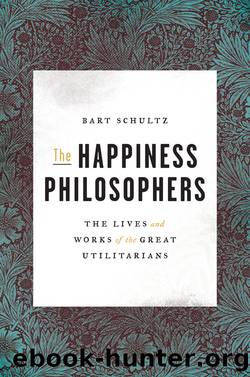The Happiness Philosophers by Schultz Bart;

Author:Schultz, Bart;
Language: eng
Format: epub
ISBN: 4850332
Publisher: Princeton University Press
Methods and Method
Really, in this as in other departments, my tendency is to scepticism, but scepticism of a humble, empirical, and more or less hopeful kind.
—SIDGWICK, MEMOIR
Again, of all the classical utilitarians, Sidgwick stands out for the remarkable analytical penetration of his philosophical work, especially in ethics. The “pure white light” of his intelligence, as an admirer called it, could bring a discerning subtlety to any subject on which it shone. Although there was a certain lull in Sidgwick’s reputation in the early twentieth century, a long string of philosophical eminences—from C. D. Broad and Brand Blanshard, to William Frankena, R. M. Hare, John Rawls, and J. B. Schneewind, to Peter Singer, Roger Crisp, and Derek Parfit—have applauded Sidgwick’s Methods as not only his best book, but possibly, as Broad, a later successor to Sidgwick’s Cambridge chair, famously put it, “on the whole the best treatise on moral theory that has ever been written, and … one of the English philosophical classics.”60 As stressed in earlier chapters, de Lazari-Radek and Singer, in The Point of View of the Universe, have argued that progress in philosophical ethics involves nothing less than a return to Sidgwick:
In this book, we have followed the main lines of Sidgwick’s thinking about ethics, and tested his views both against our own reasoning and against the best of the vast body of recent and current philosophical writing on the topics he addresses. The overarching question we have sought to answer is whether Sidgwick’s form of utilitarianism can be defended. In most respects we believe it can be. Parfit’s claim that, in the long tradition of ethics, “Sidgwick’s book contains the largest number of true and important claims” stands up well.61
Cogently defending Sidgwick’s central claims is obviously no small task, but the philosophical ingenuity that has gone into the rehabilitation of Sidgwick’s views can only be described as formidable. De Lazari-Radek and Singer in fact attempt to improve on Sidgwick’s position in what they take to be his own terms, defending the ambitious view that the only truly rational option is impartial universal benevolence, reasons from the moral point of view, or as Sidgwick called it, “the Point of View of the Universe.” And not only do they accept Sidgwick’s Intuitionist or Rationalist account of reason, but they allow that, as Sidgwick maintained, the most defensible account of ultimate Good, of value theory, is the hedonistic one.62 Hence the previously remarked irony that the most ambitious defenses of the classical utilitarian view place Mill’s superstructure on a different, more Whewellian, cognitivist foundation, a move that would have flabbergasted Mill and made him worry about how progressive any such utilitarianism could possibly be, even if its author proclaimed himself a disciple. Sidgwick may have continued to develop Mill’s claims about the utilitarian grounding of common-sense morality and the justifications for socialistic intervention in the economy, and no doubt the work he was doing with like-minded educational reformers did make Mill feel much better about what was going on at the ancient universities.
Download
This site does not store any files on its server. We only index and link to content provided by other sites. Please contact the content providers to delete copyright contents if any and email us, we'll remove relevant links or contents immediately.
Hit Refresh by Satya Nadella(8328)
The Girl Without a Voice by Casey Watson(7259)
When Breath Becomes Air by Paul Kalanithi(7252)
Do No Harm Stories of Life, Death and Brain Surgery by Henry Marsh(6332)
A Court of Wings and Ruin by Sarah J. Maas(6054)
Hunger by Roxane Gay(4208)
Shoe Dog by Phil Knight(4155)
Everything Happens for a Reason by Kate Bowler(4061)
A Higher Loyalty: Truth, Lies, and Leadership by James Comey(4024)
The Rules Do Not Apply by Ariel Levy(3897)
Tuesdays with Morrie by Mitch Albom(3827)
The Immortal Life of Henrietta Lacks by Rebecca Skloot(3819)
How to Change Your Mind by Michael Pollan(3668)
Millionaire: The Philanderer, Gambler, and Duelist Who Invented Modern Finance by Janet Gleeson(3565)
All Creatures Great and Small by James Herriot(3506)
Elon Musk by Ashlee Vance(3446)
Tokyo Vice: An American Reporter on the Police Beat in Japan by Jake Adelstein(3433)
Man and His Symbols by Carl Gustav Jung(3309)
The Money Culture by Michael Lewis(3276)
